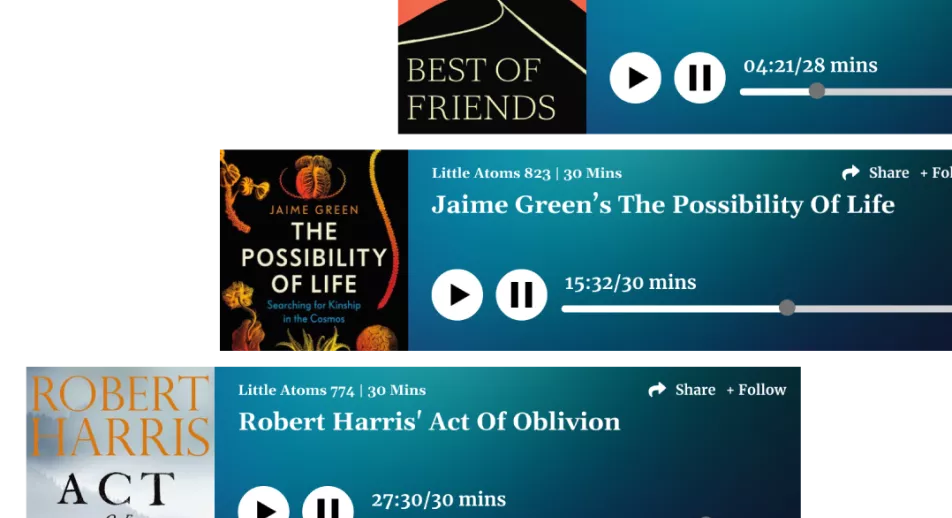Life in TV times
Clive James takes on the box set - the first true 21st-century artform

As the nation’s political leaders jostled for position after the Brexit vote in the EU referendum, a popular hot take among lazy journalists was to say how it was all “just like Game of Thrones”. The desire to seek meaning (or a fashionable analogue) in American television cropped up during the US presidential election too, with references to Game of Thrones, Mad Men and House of Cards.
This was of a piece with the election itself, which blurred the distinctions between news and entertainment, and closed with a reality TV star being elected the most powerful man in the world. Both political events have sparked much talk of “elites” and “the people”, mirroring some old but enduring debates about popular culture, including television: Are people simply fools who vote against their interests, and spend half their lives watching garbage? Are they being fooled by those in power – dupes of unscrupulous big shots? Or should we just respect their choices, and scorn anyone who questions the collective wisdom of “the people”?
Some answers might be found in the work of veteran telly-watcher Clive James, whose latest book, Play All: A Bingewatcher’s Notebook, weighs up the various box set drama serials conquering the world, since cable channels like HBO began showing the old networks how it’s done.
James has been glued to the box for most of his life, first as a TV critic for the Observer from 1972 to 1982, and then for 20 years looking from the inside out, as a broadcaster. His work since being diagnosed with leukemia in 2010 – two books of new poetry, a translation of Dante's Divine Comedy, two books of literary criticism, publication of his collected poems, and a commentary on Proust, (written in verse, for heaven’s sake) – is more than most writers will achieve in a lifetime.
It might seem like a bit of a come down to write about TV shows that resemble the trashier end of the book market – full of gangsters, swordfights and grisly crime scenes,with lavish helpings of sex and violence. But that would be to mistake James’s MO.
“The mission of Play All is to treat the box set as a cultural force worth taking seriously”
For 40 years, Clive James has raised the tone of popular criticism, and brought high culture within the reach of anyone who wanted it. To say James is a master of the high and the low has become a cliché. It’s more true to say he rejects the distinction, seeing all art (and humanist endeavour) as part of a whole, where the only real distinction is one of quality.
Anyone familiar with James’s writing or broadcasting won’t be surprised to learn that he venerates The West Wing for Aaron Sorkin's ultra-smart dialogue. Nor will close readers expect Band of Brothers to be anywhere outside the top of box set hierarchy. (James can seemingly identify the model and history of a World War Two fighter plane at 60 paces, in the dark.) The mission of Play All is to treat these shows as a cultural force worth taking seriously – but by the general viewer, rather than lofty experts,in the democratic spirit James brings to all his writing.
James praises these shows as an antidote to the superhero gymnastics of recent Hollywood output, and what he calls the “semi creative” medium of reality TV – one that did so much to boost the profile of Donald Trump.(In case you think we Brits are immune to the charms of the telescreen, ask yourself how Nigel Farage and Boris Johnson got to be household names.)
Here it’s worth a moment to consider James’s politics, and how they relate to his ideas about culture. He’s not romantic about what art can do, often citing Peter Cook’s joke regarding “those wonderful Berlin cabarets which did so much to stop the rise of Hitler and prevent the outbreak of the Second World War”.
Like any true humanist,James believes culture must be defended for its own sake, though he argues it can also give warning signs of a society going wrong, as in the case of Europe in the early 20th century. James’s 2007 work Cultural Amnesia– the book he quit television to write – is the key text here, and lays out his general view that liberal democracy needs to be defended against totalitarianism.
While this position can lead to complacency – even in a liberal democracy, some animals are more equal than others – it takes on a new force at a time when children are once again being gassed to death, (as they were during James’s boyhood in the 1940s), while people in relatively free countries pretend they can’t see the difference between democracies and dictatorships.
It’s in this context that Play All packs its best punches, and is most useful for our discussions about populism. (I should say at this point that my application of James’s ideas here is just that, and my views shouldn’t be mistaken for his.) Let’s take James’s chapter on The Wire, one of his favourite box sets and the one I know best. David Simon’s tragic love letter to Baltimore is unique in television drama for its complex treatment of how political economy shapes the lives of those at the bottom of society.
It has scores of three-dimensional characters, each trying to get through their day as best they can, more worried about paychecks and promotions than trying to save the world. All of them do terrible things, but remain capable of great heroism and dignity, as exemplars of what Saul Bellow called “the universal eligibility to be noble”. The Wire rings true in a way onscreen drama rarely manages, and rewards the intelligence of the viewer who is willing to pay attention. It might even make you laugh.
“Donald Trump’s The Apprentice offers lifestyle porn for every wannabe gazillionaire”
By contrast, (and though it’s outside the remit of Play All), take a look at the show that brought Donald Trump into millions of American living rooms.The Apprentice is entirely concerned with the lives of corporate executives, or people looking to become one. It offers lifestyle porn for every wannabe gazillionaire who stands ogling at the sight of a limousine, helicopter, or golden toilet.
It celebrates wealth and power to the greater glory of Donald Trump, (who, as we learn from his biographer Timothy O’Brien, was asset-poor when the show started, and used to lie about his salary from appearing on it. Even the boardroom where Trump fires people is fake).The Apprentice is Big Brother at the court of King Donald, with the only “reality” being its helping Trump step out of the screen and into the White House.
(Trump’s presidential campaign took this show on the road, exploiting the infotainment industry, celebrity culture and social media for political ends, and in doing so exposed their flaws better than any radical “cultural studies” critique.)
While The Wire movingly portrays how we are left alone with our day, with no redemption on offer from on high, in a world where any progress will have to be the fruits of our own labour, The Apprentice posits Trump as a billionaire fairy godfather, looking to pluck a happy few from obscurity to a seat at his right hand side on Mount Olympus. (It’s little wonder he was able to run for president as a national saviour in 2016. If he can be a deliverer for some, why not everyone?) And where Trump’s show rewards the most ruthless and dog-eat-dog of its wannabe executives, The Wire explores the human cost of such an ethos when it trickles down into the public water supply.
The gulf between these two examples, both in style and substance, is reflected in the relationship they have with the viewer. A show like The Wire encourages you to think for yourself, and stresses the value of the individual human life.It’s also social. As James writes, “a good box set drama … leaves you with something to discuss, and the discussion becomes part of the experience”.
Another species of entertainment,as James says of superhero schlock, “does the reacting for you”, and you’re left to gape at the spectacle of airborne martial arts – or, I would add, the opulence of Trump’s unearned lifestyle. As James writes:
“When a movie is nothing but spectacle, it is asking us to switch off our brains: a baleful modern precept of which Leni Riefenstahl was merely the pioneer.”
He could have added that Riefenstahl, too, was fond of supermen.
“The lesson of the 20th century is that there is no such thing as the masses”
For James, the lesson of the 20th century is that there is no such thing as “the masses”, only individuals, and any clever theory that disagrees is suspect. In a year when we’re told democracy is “in crisis” after people voted as if they were turkeys eager for Christmas, there’s been a temptation to dismiss the public as foolish, or even wicked.
But this would be to echo the cynicism of demagogues and media executives who are happy to exploit people’s baser instincts for profit, and who justify their elevated status by pretending that “the public gets what the public wants”. (Or as HL Mencken, the most eloquent of all misanthropes, once put it: “Democracy is the theory that the common people know what they want, and deserve to get it good and hard.”)
In reality, both pop culture and democracy are top-down enterprises run by powerful elites, but which rely on giving a measure of power to the people. While many of those in charge view the public as dogs who will or won’t eat the dog food being offered them, this doesn’t mean the rest of us have to share that cynicism, or blame the victims when they chomp the wrong product.
Without some radical changes, we can’t choose what TV shows are produced, any more than we can really choose what politics is on the ballot. But we can decide what we watch, and how we use it, and though this is a very limited form of agency, (the sort market-worshippers tell us actually is democracy), it’s one we should value as an advantage over societies that don’t have it, and nurture as a guard against autocratic trends within our own. We ought to hone our ability to discriminate – both in our politics and in what culture we consume.
While it won’t keep the wolves at bay, television drama that deals with the extremes of human experience, with characters who feel doubt and face moral choices, is a better way to spend your time than living vicariously through the Kardashians.
Clive James proves you can seek to preserve the best of our cultural inheritance without being reactionary, and embrace what is good about modernity without being trendy. While would-be tyrants like Trump, to paraphrase James’s favourite line from Camus, “conduct monologues above a million solitudes”, a frail Aussie poet writes as one participant in an ongoing conversation – about television, and about everything else.




